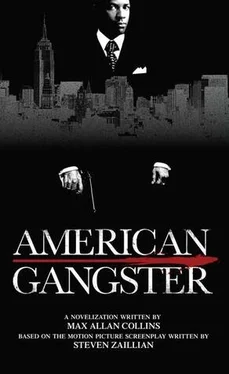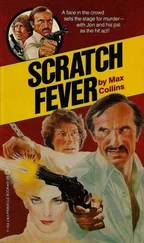Max Allan Collins
American Gangster
“Anyone is capable of anything.”
CHESTER HIMES
“Tell those bastards that Eliot Ness can’t be bought.”
ELIOT NESS
“There is no peace, saith the Lord, for the wicked.”
ISAIAH 48:22
Somewhere in Southeast Asia
Frank Lucas entered a natural cavern the size of an airplane hangar. A general of the Chinese Kuomintang examined Frank’s papers, studied him for a moment, and said, “How would you get it into the States?”
“What do you care?”
“Who do you work for in there?”
Again, Frank replied, “What do you care?”
“Who are you, really?” the general asked.
“It says right there. Frank Lucas.”
“I mean, who do you represent ?”
“Me.”
“You think you’re going to take a hundred kilos of heroin into the U.S. and you don’t work for anyone? Someone is going to allow that?”
Frank shrugged.
“After this first purchase, if you’re not killed by Marseilles importers — or their people in the States — then what?”
“Then there’d be more. On a regular basis. Though I’d rather not have to drag my ass all the way up here every time...”
Two days before Thanksgiving 1970, Frank Lucas had things to do for Bumpy Johnson. As usual.
On that cold sunny afternoon, Frank’s first stop was a funky little jazz club, one of those basement joints where cigarette smoke and spilled-liquor smell passed for atmosphere, and volume from the combo on the postage-stamp stage stood in for talent.
The bartender who glanced up warily from polishing glasses knew that Frank’s businesslike, businessman demeanor was deceiving. With his tailored charcoal suit and crisply knotted tie, Frank was as tall and handsome and confident as Sidney Poitier, if not as dark. He had left his topcoat in the waiting Lincoln Town Car, desiring freedom of movement.
Without seeming to rush, Frank strode to a back booth where four black dudes with terrible taste in attire looked up with lidded eyes and sneering expressions, unhappy to be interrupted in their private talk of business that they no doubt felt was none of Frank’s, or his boss Bumpy’s.
They were wrong, and Frank told them so, or tried, as the din of music made it hard for them to get his words. The men leaned forward to hear better and Frank took a revolver from his pocket and shot them in their respective heads.
This they heard.
And Frank was gone before anyone had time to scream.
His next stop was 116th Street where he oversaw Bumpy’s annual Thanksgiving turkey toss. Frank, like everybody in Harlem, thought of his boss as “Bumpy,” though Frank (even as close as the two men were) always paid him the respect of “Mr. Johnson” when they spoke.
Bumpy would stand up there in the flatbed truck, a benign king dispensing freshly butchered turkeys like benedictions, and poor folk in their tattered clothes would crowd around and grin up at him gratefully and an elegantly attired Bumpy would grin right back.
Frank had no idea how old Bumpy Johnson was, though everybody knew he’d been around forever, the Robin Hood of Harlem who stood up to Dutch Schultz himself back in Prohibition days. So, hell, by any yardstick the old boy was elderly, and yet up there pitching turkeys to the crowd, he looked sturdy as Woody Strode.
And as rich as God, in that cashmere topcoat and silk scarf and those leather gloves, his head of Brillogray hair bare. As far as Frank was concerned, this man was God; Jesus Christ Himself never saved anybody better than Bumpy had Frank.
Frank had come up from North Carolina already a career criminal, and started indiscriminately ripping off everything and everybody from jewelry stores to crap games. Some of those crap games had included Harlem gangsters and, Frank now knew, such recklessness would have caught up with him... if Bumpy Johnson hadn’t caught up with him first.
Frank had been hustling at Lump’s Pool Room on 134th Street, taking chumps for eight ball. A tall duded-up motherfucker called Icepick took the bait, displaying a choke-a-horse roll of bills. And Frank — having no idea this was a stone killer who freelanced to the Mafia — decided that Icepick’s roll was going to be his, whether at the pool table or with a gun in an alley.
Icepick wanted to shoot a thousand-dollar game of pool, but Frank only had a hundred dollars, which prompted Icepick to wonder aloud what kind of goddamn punk goes around with nothin’ but a lousy C-note on his skinny ass.
Frank was seconds away from saying he really did have a thousand after all, ready to reach for his piece when a Bourbon-smooth voice from behind asked him: “Son, can you beat this boy?”
Frank turned and saw a black man the likes of which he’d never seen: close to six foot, dark-complected, in a gray suit sharper than a serpent’s tooth and a maroon tie and camel’s-hair overcoat with a flower in the lapel, a Homburg perched jauntily on a big noggin. Looked like he walked out of an ad in Esquire .
“I can shoot pool with anybody on the planet, mister.”
“Then how about I back you. Fifty-fifty split?”
“Cool.”
Suddenly Icepick was as twitchy as a flea on a skillet. “Bumpy, man — you know I don’t never bet ’gainst you. ”
But this Bumpy character paid Icepick no heed, just thundered, “Rack ’em up!”
As Bumpy watched silently, the two players rolled for the break, Frank took it, and crushed the dude. Icepick never got off a damn shot. Took his beating, paid up and slunk off.
Afterward, Bumpy told Frank to come along with him, and Frank didn’t argue. Soon they were in a chauffeured Caddy, and Bumpy directed them straight to the best men’s clothing store on Lenox Avenue, where the benefactor picked out for his new charge the nicest suits, slacks, ties, you name it.
For six months, Frank slept in the front room of Bumpy’s place. And everybody in Harlem, including men he’d robbed, from the jeweler to various hoodlums, started paying seventeen-year-old Frank Lucas respect.
Why Bumpy had taken Frank under his wing like that Frank never knew and sure as hell never asked; but the older man must have seen potential in the kid from North Carolina. Bumpy personally showed Frank the ropes, from figuring the vig to doing the collections. And everybody in Harlem paid Bumpy Johnson. The protection racket was the foundation of Bumpy’s business.
Now, twenty years later, Frank was still at Bumpy’s side — his driver and bodyguard and collector and protégé. The turkeys tossed, the two men — with Bumpy leading his loyal German shepherd on its leash — were walking toward the Wells Restaurant when the nattily attired older gangster paused and pointed. His leather-gloved finger indicated a vast wall of TVs playing in the expanse that was the window of the latest of these discount emporiums popping up everywhere, like plastic-and-metal mushrooms.
“ This is the problem,” Bumpy said.
Frank wasn’t sure what his boss meant — did he mean the Vietnam War? The image playing on all of the screens showed soldiers in the jungles of that distant land. You could hear the whisper of gunfire through the glass.
“This,” Bumpy said, shaking his head woefully, “is what’s wrong with America.”
Frank nodded, still not sure he was getting it. Politics wasn’t something either of them talked much.
“It’s gotten so big,” the sonorous voice was intoning, “you can’t find your way.”
Then Bumpy led both his watchdogs on, human and canine, a Red Sea of pedestrians parting — whether out of respect or fear, what did it matter? — and the two men approached the entrance to the big discount store.
Читать дальше












